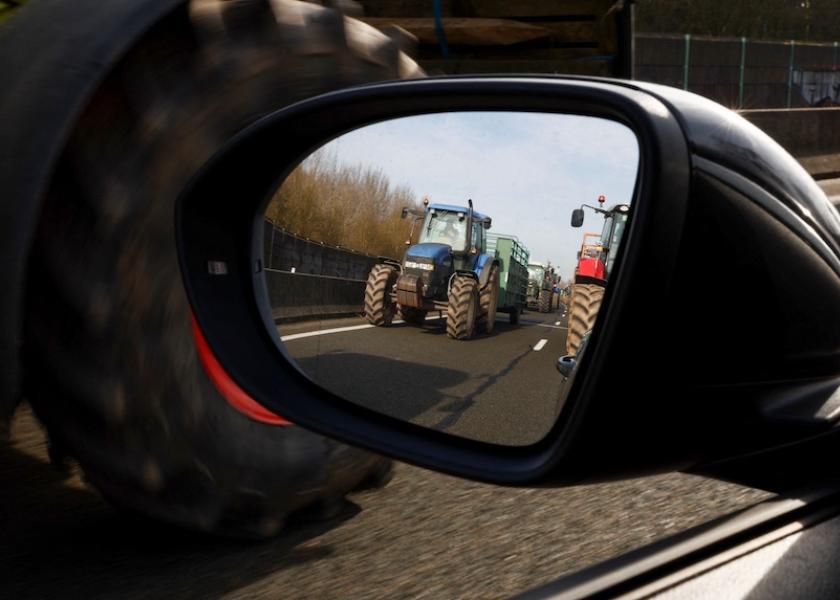Why Farmers Are Protesting In Europe

Farmers are protesting across the European Union, saying they are facing rising costs and taxes, red tape, excessive environmental rules and competition from cheap food imports. Demonstrations have been taking place for weeks in countries including France, Germany, Belgium, the Netherlands, Poland, Spain, Italy and Greece.
While many issues are country-specific, others are Europe-wide. Here is a detailed look at the problems that have prompted the protest movement across the bloc and in individual countries.
IMPORTS
Demonstrations in eastern Europe have focused on what farmers say is unfair competition from large amounts of imports from Ukraine, for which the EU has waived quotas and duties since Russia's invasion. Polish farmers have been blocking traffic at the border with Ukraine, which Kyiv says is affecting its defense capability and helping Russia's aims. Meanwhile, Czech farmers have driven their tractors into downtown Prague, disrupting traffic outside the farm ministry.
The farmers resent the imports because they say they put pressure on European prices while not meeting environmental standards imposed on EU farmers. Renewed negotiations to conclude a trade deal between the EU and South American bloc Mercosur have also fanned discontent about unfair competition in sugar, grain and meat.
RULES AND BUREAUCRACY
Farmers take issue with excessive regulation, mainly at EU level. Centre stage are new EU subsidy rules, such as a requirement to leave 4% of farmland fallow, which means not using it for a period of time.
They also denounce bureaucracy, which French farmers say their government compounds by over-complicating implementation.
In Spain, farmers have complained of "suffocating bureaucracy" drawn up in Brussels that erodes the profitability of crops.
In Greece, farmers demand higher subsidies and faster compensation for crop damage and livestock lost in 2023 floods.
RISING DIESEL FUEL COSTS
In Germany and France, the EU's biggest agricultural producers, farmers have railed against plans to end subsidies or tax breaks on agricultural diesel. Greek farmers want a tax on diesel to be reduced.
In Romania, protests in mid-January were mainly against the high cost of diesel.
In France, many producers say a government drive to bring down food inflation has left them unable to cover high costs for energy, fertilizer and transport.
WHAT ARE GOVERNMENTS DOING?
The European Commission late last month proposed to limit agricultural imports from Ukraine by introducing an "emergency brake" for the most sensitive products - poultry, eggs and sugar - but producers say the volume would still be too high. The Commission has also exempted EU farmers for 2024 from the requirement to keep some of their land fallow while still receiving EU farm support payments, but they would need to instead grow crops without applying pesticides.
French Prime Minister Gabriel Attal announced measures including controls to insure imported foods do not have traces of pesticides banned in France or the EU, and talks to get farmers higher prices and loosen bureaucracy and regulation.
Paris and Berlin have both relented to the pressure and rowed back on plans to end subsidies or tax breaks on agricultural diesel. In Romania, the government has acted to increase diesel subsidies, address insurance rates and expedite subsidy payments.
In Portugal, the caretaker government has announced an emergency aid package worth 500 million euros, including 200 million euros to mitigate the impact of a long-running drought.
WHY FARMERS ARE PROTESTING, BY COUNTRY:
FRANCE
- EU red tape
- Diesel prices
- Need more support to shore up incomes
- Access to irrigation
- Criticism over animal welfare and use of pesticides
POLAND
- Cheap imports from Ukraine
- EU regulation
CZECH REPUBLIC
- Bureaucracy
- Cheap imports
- EU farm policy
SPAIN
- "Suffocating bureaucracy" drawn up in Brussels that they say erodes the profitability of crops
- Trade deals that they say open the door to cheap imports
PORTUGAL
- Insufficient state aid, subsidy cuts
- Red tape
ROMANIA
- Cost of diesel
- Insurance rates
- EU environmental regulations
- Cheap imports from Ukraine
BELGIUM
- EU requirement to leave 4% of land fallow
- Cheap imports
- Subsidies favoring larger farms
GREECE
- Demands for higher subsidies and faster compensation for crop damage and livestock lost in 2023 floods
- Diesel tax and surging electricity bills
- Falling state and EU subsidies
(Reporting by Sybille de La Hamaide and Gus Trompiz; Editing by Crystal Chesters)







